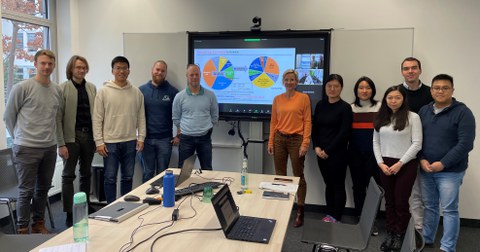Nov 24, 2022
Guest lecture by Prof. Atzler - Transformation of energy and mobility systems
What will our energy of tomorrow look like and where will we get it from? Together with his institute colleagues, Prof. Frank Atzler (Chair of Combustion Engineering and Drive Technology) has been investigating this question. The results of this research are summarized in his new publication "Ecological and Economical considerations on the Energy and Mobility Transition". Under the title "Transition of Energy and Mobility Systems - How will we move about tomorrow?", Prof. Atzler presented the results to the students of the Boysen-TU Dresden Research Training Group on November 17th, 2022.
His presentation began with important facts: The annual energy demand of Germany currently totals around 3600 TWh, of which approximately 15 percent is obtained from renewable energy sources. Almost 70 percent of primary energy is imported (source: https://ag-energiebilanzen.de/en/). According to Prof. Atzler's calculations, complete independence of Germany and Europe from energy imports is most likely not achievable in the short or medium term. Although it is not possible to cover the country's own energy needs with national resources and plants, the technologies used locally have sufficient mass appeal and take on a role model function to make them interesting for export as well. This raises the question: How can this be done affordably and realistically?
Based on this question, Prof. Atzler's calculations suggest hydrogen and methanol as promising energy carriers of the future. Both could be imported to Germany by sea. In this context, Prof. Atzler attaches greater importance to the "cost" factor than to the "efficiency" factor. The reasoning: For a stable, economic and environmentally compatible energy supply, industrial manufacturing processes are needed that can produce electricity reliably, in very large quantities and at low cost. Production in wind- and sun-rich regions of the world, including tanker transport and further distribution, is significantly cheaper than wind and solar energy produced in Germany.
The holder of the professorship for combustion engines and drive technology at the TU Dresden concluded his lecture with the following summary:
The future of a "green" world energy supply consists of the triad of electricity, hydrogen, and a liquid energy carrier. It is the task of the EU to create the appropriate framework conditions and to recognize and establish the CO2 neutrality of liquid energy carriers as a building block for solving the climate crisis. Only then will investments in this solution become attractive for donors and industry.
The topic aroused great interest among the RTG's doctoral students. Valuable discussions about potential cooperations and open questions to deepen the topic enriched and concluded the guest lecture.
We sincerely thank Prof. Atzler for his far-sighted vision on this complex topic.

